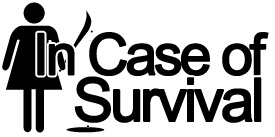Teamwork will be vital in the days, weeks and even months immediately following the apocalypse. Grab Tom, Dick and Harry and band together to eek out a meager existence.
However, once the mutants are contained and the infected have died off, leaving only a population of survivors, you’ll need some sort or population organization system.
Understand your options and the pros and cons they include.
Tribal Anarchy is the most likely system in the case of all out devastation and a more than 50% population drop. Those who were once qualified to rule will no longer be when resources are scarce and survival means something different every 150 miles.
Tribal Anarchy
Tribalism is very strong loyalty that someone feels for the group they belong to, usually combined with the feeling of disliking all other groups or being different from them
Anarchy is a state of lawlessness and disorder (usually resulting from a failure of government)
With tribal anarchy, each group or tribe has its own rules and organization, however, there is no overall or state organization, leadership or law. So, if you like your tribe and stay away from other tribes, you should live a fine life. Unfortunately, when your neighboring tribe runs out of resources, they might come and steal yours. And if you can’t stop them, there’s no one to come to your aid.
Examples: Mad Max and Rage (video game)
However, if all the major resources are controlled by the military or paramilitary we’d end up with a Police State (stratocracy).
Military/Police State
A stratocracy is a form of military government in which the state and the military are traditionally the same thing and government positions are always occupied by military leaders. The military’s political power is supported by law and the society. (source)
When left on the other side of an apocalypse, some people will turn to God, and faith, and prophecy. They’ll find someone who speaks clearly and calmly about these topics
The powerlessness brought about by a post-apocalyptic landscape will encourage some to believe in the message of those who have dealt with it in a more passive manner.
Eventually, this listening turns to following and this following turns into obedience of teachings and eventually we have laws based on the desires of deities as discerned by someone who is not a deity but a person who feels they have (or is felt to have by others) a better connection with deities than regular folk.
Regular folk would follow the teachings and translated desired of the deities as law. And so we would have theocracy.
Theocracy
A form of government where the rulers claim to be ruling on behalf of a set of religious ideas, or as direct agents of a deity.
The least likely form of government to spring out of an apocalypse would be democracy.
Democracy
In a democracy, the government is elected by the people. Everyone who is eligible to vote – which is a majority of the population – has a chance to have their say over who runs the country.
People will want it but be unable to make it happen with out more powerful individuals ensuring the voices of the less powerful get heard.
In that case, the less powerful are dependent on the more powerful and the more powerful don’t really have much motivation to listen.
The weak could rise up as one, but that would mean they’d all have to agree and elect a leader or spokes person. Now we’ve gone back to tribes, but this time based on ability to communicate and amass power, thus, creating a Caste System.
A caste system is a type of social structure which divides people on the basis of inherited social status.
Some other options:
Monarchy
A monarchy has a king or queen, who sometimes has absolute power. Power is passed along through the family. (source)
Key: Monarchies don’t just happen, they usually evolve out of coups, dictatorships, and over-grown tribes.
Pros: In a monarchy, regular folk mostly just do their jobs and get left alone as long as they don’t cross any one powerful.
Cons: Your opinions don’t count. If the monarchs aren’t competent you’re shit out of luck. Also, in an unchecked monarchy citizens are pretty much property of “The Crown”.
Example: Doomsday
Oligarchy and Corporate Oligarchy (Corporatocracy)
A form of government which consists of rule by an elite group who rule in their own interests, especially the accumulation of wealth and privilege. Only certain members of society have a valid voice in the government. (source)
Key: The desires of an oligarchy are usually their own and rarely concern improving the life of the people. Sometimes members of the oligarchy have conflicting interests.
Pros: In the case of a corporate oligarchy, with competing corporations, progress and brand loyalty will result in improved lifestyles for citizens (as long as they occupy a buying class and not a builder class… And as long as you’re able to freely choose any brand you like with out persecution).
Cons: People are usually considered pawns and used only to amass power through their allegiance or obedience to the ruling group’s desires.
Example: Mutant Chronicles
Dictatorship
Rule by a single leader who has not been elected and may use force to keep control. In a military dictatorship, the army is in control. Usually, there is little or no attention to public opinion or individual rights. (source)
Key: One person in charge. My house, My rules.
Pros: In a monarchy, regular folk mostly just do their jobs and get left alone as long as they don’t cross any one powerful.
Cons: Your opinions don’t count. If the monarchs aren’t competent you’re shit out of luck. Also, in an unchecked monarchy citizens are pretty much property of “The Crown”.
Example: ...
Pick you poison…
[poll id=”2″]



Dictatorship, but only if I’m in charge.
Tribal anarchy seems like so much fun if you’ve got the right folks on board… and your neighbors are weaker than you…